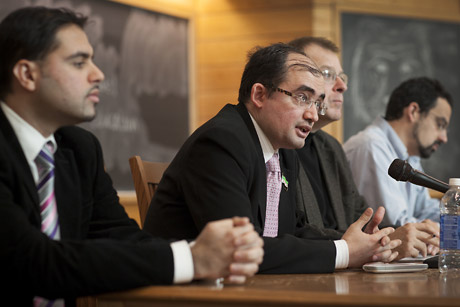Experts debate the Syrian crisis in age of Facebook
By Sushmitha Krishnamoorthy

What started as a peaceful protest against the regime in Syria in March 2011 soon turned into a gory civil war that persists today.
One of the demonstration leaders, Ghiyath Matar, was known as “Little Gandhi” for his commitment to nonviolence.
“The air force security arrested him, and three days later they delivered his body to his family. He had been tortured to death,” recounted Radwan Ziadeh, foreign spokeperson of the Syrian National Council, in a panel discussion on campus Nov. 25 with David Patel, Cornell assistant professor of government, and Wasif Syed, Ph.D. ’09, a RAND Corp. analyst.
Ziadeh continued: “Then people questioned the peaceful demonstrations: Do we have to continue?” Then civil war erupted, and more than 150,000 Syrians have died in those 30 months of conflict, Ziadeh said.
Patel shared three ways to view the war: “First: as an Iran-Saudi Arabia cold war. It’s not fought directly between them. It’s fought out in states that are domestically weak.” Then he suggested that it could be seen as a call for a revolution, as the Syrian conflict arose from the Arab Spring. Thirdly, he said it could be understood as a sectarian conflict between the Sunnis, Shias and Alawites. “It is a deeply divided society suddenly being exposed,” Patel said.
The Assad regime of Syria is known to use long-range missiles on its civilians, said Ziadeh. “These missiles take 15 to 17 minutes to reach their destination. The people do not have access to anti-missiles. So this is where they use Facebook. When someone knows a missile has been launched, they post it on Facebook immediately. The people have 15 to 17 minutes to escape,” said Ziadeh. Around 6,000 civilians have been killed by these missiles, he noted.
It has been confirmed that in August 2013, the Assad regime committed a war crime by using sarin gas, a weapon of mass destruction, on its civilians. “The international community can take responsibility to protect the citizens from the state itself. But the [UN] Security Council was unable to take any action,” said Ziadeh.
“When we think of international intervention, we think of players like USA, Britain, France or NATO,” Patel pointed out. “But there already is plenty of international intervention. The major players are regional states like Jordan, Qatar, Saudi Arabia and Iran, and nonstates such as the Hezbollah and al-Qaida.” He argued that at this stage of the crisis, the opposition is so fractured that negotiation is difficult. So the international community can only primarily focus on ameliorating the suffering of the people.
Drawing from his experiences from visits to Syrian refugee camps in Turkey, Syed noted the poor conditions at the camps. He attributes them to the disconnect between the agencies working on ground and the agencies supplying the aid.
“It is not that aid or technology is not available. The aid money takes a lot of time to reach where it is needed. Only about 10 percent of the aid is actually used, because a lot of the money is lost to middlemen in the transition,” explained Syed.
The event was hosted by Cornell’s Muslim Educational and Cultural Association and co-sponsored by 16 campus organizations.
Sushmitha Krishnamoorthy ’17 is a writer intern for the Cornell Chronicle.
Media Contact
Get Cornell news delivered right to your inbox.
Subscribe